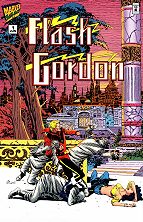 Flash
Gordon
Flash
Gordon
 Flash
Gordon
Flash
Gordon
(1995 - two issues, deluxe format, Marvel Comics)
Writer: Mike Schultz. Art: Al Williamson.
In the mid-1990s, Marvel Comics released two deluxe format mini-series, printed on expensive paper, based on classic newspaper series: Prince Valiant and, this, Flash Gordon (at least, I'm only aware of just the two). In both cases, the idea -- surprisingly -- was not to overhaul, update, re-imagine, or otherwise mess with the formula, but to tackle the characters with respect and even reverence.
Well, the Prince Valiant mini-series maybe tried to craft a more brooding epic than the newpaper strip probably does, but it was still intended to appeal to purists and long time fans. It may well have been intended to be kind of the Prince Valiant story; and epic's epic. The Flash Gordon series isn't going for the same grandeur.
Flash Gordon (for those who don't know) began in the 1930s. A science fiction strip in the Edgar Rice Burroughs mould, it followed the adventures of earthman Flash, his girl friend, Dale Arden, and scientist Hans Zarkoff, on the planet Mongo, usually battling the evil Ming the Merciless in a world of monsters, super science, and sword play, populated by one strange kingdom after another. The strip (I believe) occasionally left Mongo, in an attempt to be a more general SF strip, but Flash and his friends usually ended up back on Mongo because that defined the strips' identity.
Considerably shorter than the Prince Valiant series, this mini-series only runs two issues which, without ads, comes to about 60 pages in total. The whole point is just to tell an old fashioned Flash Gordon adventure (the character perhaps as well known for the reasonably faithful movie serials staring Buster Crabbe as for the strip itself) full of running about, narrow escapes, strange races, and opulent cities, all taking place on good old Mongo. It's not sophisticated...but it isn't supposed to be! This is pure, cornball escapism.
And it's a lot of fun.
A big appeal is the beautiful art by old master, Al Williamson. Williamson has had a long, if sparodic, history of drawing Flash, and his elegant, Romantic style is vaguely evocative of Flash creator Alex Raymond. Actually, it's not quite like Raymond's, at least based on the old Raymond art I've seen (from the mid to late 1930s); Williamson's is actually better, more disciplined, more detailed in its cities and ships. Raymond's art, a bit looser and scratchier, actually reminded me of Tom Yeates or even Berni Wrightson. Still, that's just quibbling, because Williamson's style is still reminiscent of Raymond's and will doubtless appeal to purists. And Williamson pencils grand cities and lush jungles, heroic men and beautiful -- and sometimes scantily clad -- women. MModern comics readers might recognize Williamson from his art on some of the Star Wars newspaper strips (along with artists Russ Manning and Alfredo Alcala) which has been collected in Classic Star Wars comics and TPB volumes by Dark Horse Comics.
Mike Schultz writes in a breezy, light style that keeps things clipping along. There's no heavy brooding, or deep characterization per se, but he does throw in a few questions and mysteries that keep the reader wondering where it's all headed. Most important: Schultz writes with conviction. There's no smarmy tongue-in-cheek, or condescension toward his nostalgic material the way certain other writers who come to mind might approach it. There may even be a (slight) attempt at deeper thoughts. In an interview I read with Williamson, in refering to this project, he commented on his dissatisfaction with the modern, anti-hero concept, and that this Flash Gordon would be unapologetically a paragon of old fashioned virtues. In the story, there is a sub-text about heroism, and how a good deed of Flash's pays him back later.
Williamson's idea of "old fashioned" heroism may, ironically, be more modern. In the original strips I've read, Flash, like many of his literary contemporaries, wasn't without a ruthless streak.
The second issue is a bit weaker than the first, ironically in part because Schultz slows down a bit to flesh out the plot better. There's an extended flashback to Flash's childhood which, though still rife with larger-than-life adventure, is a bit long for a comic where you're itching to get back to the other worldliness of Mongo. And when the villain behind it all is finally revealed toward the end, it seems a bit rushed -- the bad guy barely having time to appear before he's defeated! As well, Dale and Zarkov are under utilized, reduced to peripheral characters. If Schultz and Williamson wanted to create the quintessential Flash Gordon saga, Dale and Zarkov are as much a part of the series as Flash and deserved bigger roles.
But overall, the mini-series is like a breath of clean, spring air. I read it during a bit of a personal glum spell, and for the time it took me to read it, it perked me right up. It's full of charm, and wonder, and old fashioned escapism. In fact, my biggest complaint is that it was just too darn short -- it left me wishing Schultz and Williamson had crafted something more epic, like the Prince Valiant series